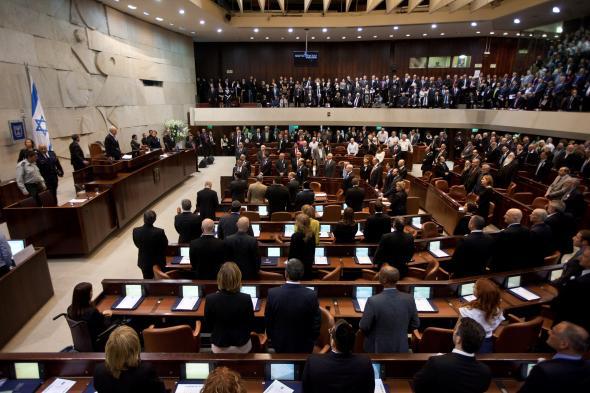When it comes to Israel’s ultra-Orthodox Jewish women, we tend to hear mostly about the terrible things that happen to them—from having to sit in the back of public buses to being banned from hosting or even calling into radio shows. Last week, the Israeli ultra-Orthodox newspaper HaMevaser created a stir when it Photoshopped German Chancellor Angela Merkel out of a photo of world leaders at the Paris solidarity march, yet another example of how women are treated or, more accurately, erased from the conversation in many ultra-Orthodox circles.
Which brings us to the current state of the Israeli Knesset. The two ultra-Orthodox parties—Shas and United Torah Judaism—are, unsurprisingly, exclusively male. In 2012, a small protest group formed under the name, “Lo Nivcharot, Lo Bocharot,” (if we can’t be elected, we won’t vote)—a modern-day version of no taxation without representation. The group, nicknamed LoNiLoBo, petitioned Israel’s Supreme Court to make it illegal for a political party to prevent women from running, but it lost. The following year, a few Haredi women ran for municipal posts (municipal elections operate differently than national ones). They received threats, and one woman ended up pulling out as a result, but Shira Gergi won and became the first Haredi woman to sit on a municipal council.
Now, a new group has formed, just in time for Israel’s March elections. Earlier this week, social activist Ruth Colian unveiled “U’Bezchutan: Haredi Women Making Change,” the first-ever Israeli political party dedicated to ultra-Orthodox women. (The party’s name translates to “in their merit,” with “their” having the feminine ending.) Colian described the party, under whose banner she will run, as representing all women who are struggling against Israel’s religious establishment. “There are many walls of fear for Haredi women within their communities. They have nowhere to turn in the Knesset.” (For instance, as the Israeli paper Ha’aretz noted, ultra-Orthodox male representatives won’t discuss breast cancer, which affects a large percentage of Haredi women. The men find the topic “immodest,” so they don’t raise public awareness for early detection.)
There has been one ultra-Orthodox female member of Knesset, Tzvia Greenfeld, but she ran on the secular Meretz party list in 2008. Colian’s campaign is the first time an ultra-Orthodox woman has run on a Haredi ticket, even if it’s a ticket just for women. (When Colian was asked why she didn’t just run on a non-Haredi ticket, she emphasized the importance of preserving her identity and demonstrating that educated women and leaders can still be Haredi.)
So will the two groups, Colian’s and LoNiLoBo, join together? Probably not. In the Forward, Elana Sztokman distinguishes between the strategies behind these two movements:
The formation of a women’s party is a very different political strategy than forming an advocacy group to get religious parties to allow women on the lists. [Colian’s] approach takes the movement for social change outside of the existing systems and suggests that change for women can only come when women have a “room of their own.” If the LoNiLoBo movement says that haredi women have faith in the parties of their religious sector but just want to have a voice, the U’Bezchutan movement says that such faith is waning.
It’s still unclear if U’Bezchutan will gain a seat in March—the Forward reports that the party would need approximately 120,000 votes to cross the threshold, which seems unlikely. (While secular women might want to support the female cause, there are many prominent non-Haredi women they can vote for, and most would not support Colian’s religious policies.) But a victory doesn’t necessarily require a seat in the Knesset this election: According to the Forward, following the U’Bezchutan announcement, the male leader of another new ultra-Orthodox party met with the women of LoNiLoBo and apparently told them that, despite saying earlier that he would not allow women to run on his ticket, he will now reconsider.
